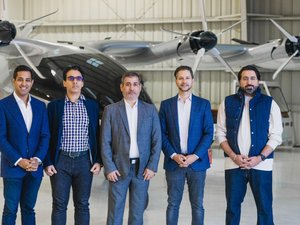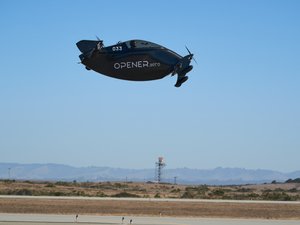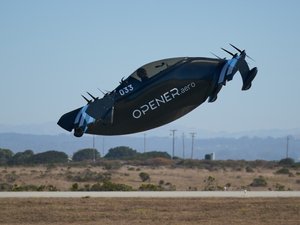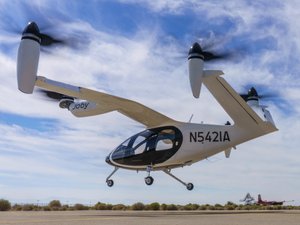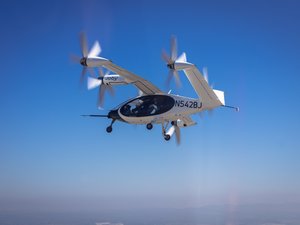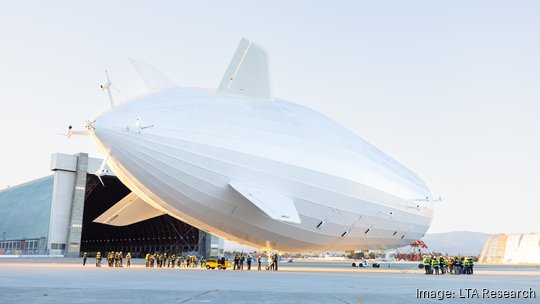
LTA Research and Exploration LLC — an aviation startup backed and founded by Alphabet Inc. co-founder Sergey Brin — is the latest developer of electric-powered aircraft to test its vehicle
The Mountain View-based company took its Pathfinder 1, a 124.5-meter-long airship, on its first test flight Wednesday morning at NASA's Moffett Field, TechCrunch reported. The 250-employee startup designed Pathfinder 1 to be a "next-generation airship," intended to to be "safer, stronger, and more efficient" than previous ones, it says on its website.
Like the Goodyear Blimp — but unlike the Hindenburg, which used hydrogen — Pathfinder 1 gets its lift from helium. Rather than being propelled by internal combustion engines, like Goodyear's airship, LTA's vehicle relies on a dozen electric motor-driven propellers that get it to a cruising speed of up to 75 miles per hour.
Those motors can rotate in numerous directions, including so that they face up, giving the Pathfinder 1 the capability to takeoff and land vertically, according to a report from Bloomberg. That makes the airship a kind of electric vertical takeoff and landing aircraft, albeit one that is distinct from most of the other eVTOL vehicles in development. Those other vehicles, such as Archer Aviation Inc.'s Midnight, are more like helicopters, relying solely on their propellers, rather than bags of air, to give them vertical lift.
In the startup's initial test flights of Pathfinder 1, the airship will be tethered to a mobile mast where a pilot will perform simple maneuvers around Mountain View's Moffett Field. The company will then perform full flights around the Bay Area, TechCrunch reported.
LTA declined to comment to the Business Journal about the test flight.
The startup envisions using Pathfinder 1 for humanitarian aid missions, IEEE Spectrum reported last month. The airship would carry and deploy cargo and personnel to areas that are inaccessible by ground transportation. Pathfinder 1 will reportedly be able to carry as many as 14 people at a time as well as roughly four tons of cargo.
LTA is not the first company to develop an electric-powered aircraft to be used in emergency situations. Petaluma-based Jump Aero Inc. is working on what it calls "the fastest" eVTOL aircraft in development for emergency response.
Jump is designing its aircraft, dubbed the JA1 Pulse, to fly emergency responders and equipment to anywhere within a 50-kilometer radius in fewer than 10 minutes, according to the company’s website. It's unclear how many people or how much cargo Jump's aircraft will be able to carry.
In early September, LTA received a special airworthiness certificate for Pathfinder 1 from the Federal Aviation Administration, which allowed the company to begin test flights "for the purposes of research and development," an agency representative told the Business Journal.
Under the certification, LTA can fly Pathfinder 1 50 times at no higher than 460 meters. The startup has to keep the airship within the boundaries of Moffett Airfield and the airspace around Palo Alto Airport. Its certification also requires that Pathfinder 1 have two pilots onboard.
The company FAA experimental certification expires next September, according to TechCrunch.
After a series of test flights in the South Bay, LTA plans to transfer its aircraft to the Goodyear Airdock airship hanger in Akron, Ohio. The hanger will also serve as the company's future manufacturing factory and where it plans to develop an even larger airship, according to IEEE. Dubbed Pathfinder 3, that airship will be 180 meters long, IEEE reported.
Headed by Alan Weston, former director of programs at NASA, LTA is one 36 Bay Area companies developing eVTOL aircraft.
According to a report by Custom Market Insights, the global marketplace for the industry could be worth as much as $68 billion by 2032. Meanwhile, venture capital backing of next-generation aircraft developers grew steadily from 2017 to 2021, rising from $600 million to $6.9 billion, according to a report by McKinsey and Company.
LTA is solely backed by Brin, who is estimated to be worth $105 billion. Thus far, Brin's invested more than $250 million in the company, Bloomberg reported, citing the startup's workers.
